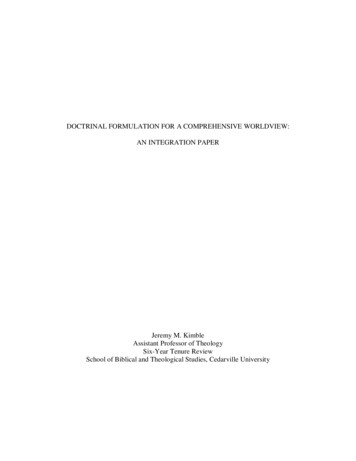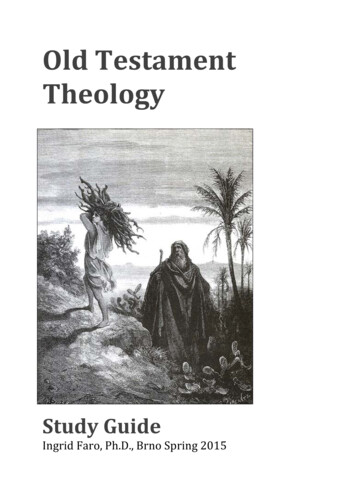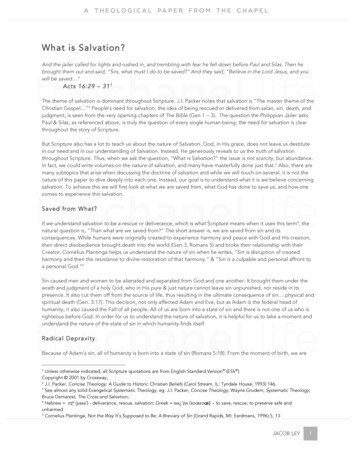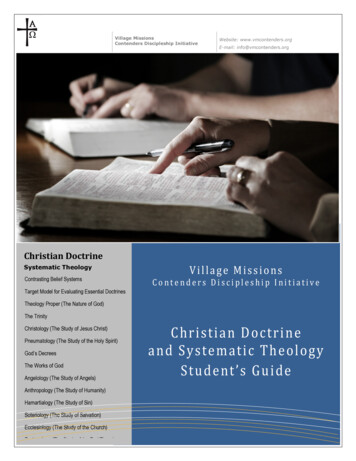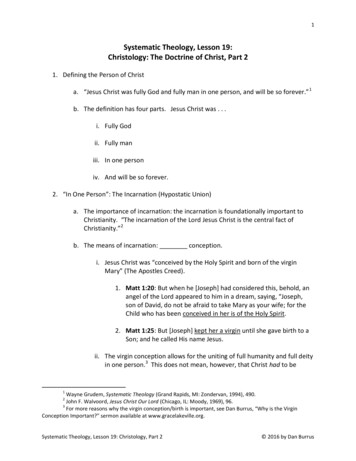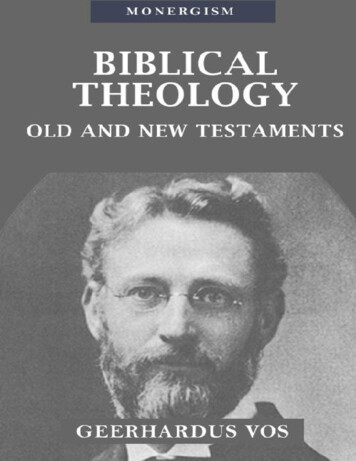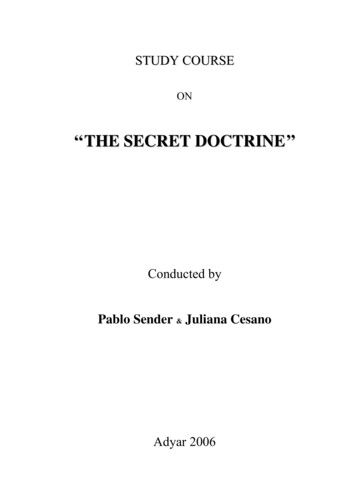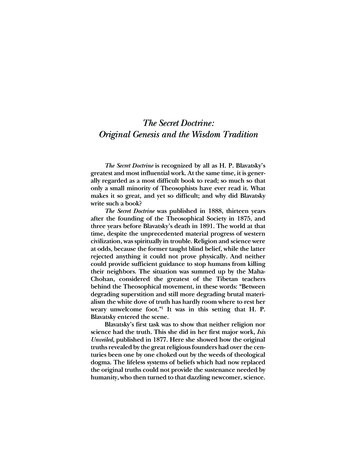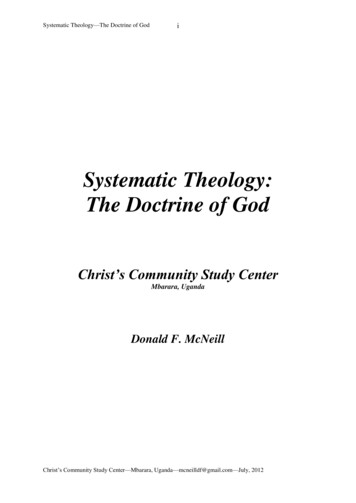
Transcription
Systematic Theology—The Doctrine of GodiSystematic Theology:The Doctrine of GodChrist’s Community Study CenterMbarara, UgandaDonald F. McNeillChrist’s Community Study Center—Mbarara, Uganda—mcneilldf@gmail.com—July, 2012
Systematic Theology—The Doctrine of GodiiThe Doctrine of God—Table of ContentsI. The Name of GodII. OT Names of GodA. EL or ElohimB. El Elyon and El ShaddaiC. Yahweh1. The active presence of God2. The aseity of God3. The immutability of God4. The redemptive name of GodD. Compound Names which Include Yahweh1. Yahweh-Sabaoth2. Yahweh-Jireh3. Yahweh-Shalom4. Yahweh-Nissi5. Yahweh-Tsidkenu and Yahweh-Mekkodishkim6. Yahweh-Rapha7. Yahweh-Raah8. AdonaiIII. New Testament Names of GodA. TheosB. KuriosC. PaterD. Jesus (Jesus Christ)1. The incarnate manifestation of God2. The name exalted above all other names3. The exclusive name by which men must be savedE. Son of ManF. Holy SpiritIV. The Attributes of GodA. The Focus upon the Essential Nature of God in Contrast to His Creation1. The Aseity of God2. The Infinity of God3. The Immutability of God4. The Incorporeality of GodB. The Focus upon the Essential Nature of God in His Authority overCreation1. The Supremacy of God in Providence (Omnipotence)2. The Supremacy of God in Knowledge (Omniscience)3. The Supremacy of God in WisdomC. The Focus upon the Essential Nature of God in His Interrelationship withCreation1. God’s Moral Conduct in Relation to His Creationa. Holinessb. Righteousnessc. Truthd. Wrath2. God’s Goodness to His Creationa. LiberalityChrist’s Community Study Center—Mbarara, Uganda—mcneilldf@gmail.com—July, 444445454647494949495050505151.5252525455575858
Systematic Theology—The Doctrine of Godiiib. Mercyc. Loved. Gracee. Patiencef. FaithfulnessD. The Goodness of God and the Problem of Evil1. Best-Possible-World Explanation of Evil2. Free-Will Explanation of Evil3. Character-Building Explanation of Evil4. The Indirect-Cause Explanation of Evil5. The ex Lex Explanation of Evil6. The ad Hominem Defense7. The Biblical Response to the Problem of Evil8. The Biblical Response to the Problem of EvilV. The Holy TrinityA. The Doctrine of the Trinity in the Old TestamentB. The Doctrine of the Trinity in the New TestamentC. The Distinction between the Ontological Trinity and the Economic Trinity1. The Ontological Trinity2. The Economic Trinitya. God the Fatherb. God the Sonc. God the Holy SpiritD. Unity and Diversity in the Godhead—Practical Implications of the Trinity1. The basis for love in all human relationships2. The basis for the proper functioning of the family3. The basis for social justice and the protection of civil rights4. The basis for the proper functioning of the churchVI. The Works of GodA. The Work of God in Predestination and Election1. Election in the Old Testament2. Election in the New Testament3. Objections to the Doctrine of Electiona. It is not fair to elect some and not others.b. If someone desperately wants to be saved, he can’t unlesshe is one of the elect.c. The doctrine of election teaches fatalism.d. If men are predestined for salvation, there is no need toevangelize and preach the gospel.e. The doctrine makes us robots.f. Unbelievers should not be held responsible for theirunbelief, since they were not the elect.g. The doctrine contradicts other passages of Scripture whichseem to teach the opposite.4. Conclusion to the Doctrine of Election and PredestinationB. The Work of God in Creation1. The Type of Literature in Genesis 1-112. The Outline of Genesis 1-43. Absolute Creation4. The Manner of Creation5. Six Day CreationChrist’s Community Study Center—Mbarara, Uganda—mcneilldf@gmail.com—July, 767777787879818183868687878788888989909191929395
Systematic Theology—The Doctrine of Godiva. The First and Second Day—Separation of Firmamentfrom the Watersb. The Third Day—The Seas are Collected in One Place,Dry Land Appears, Plant Life Appearsc. The Fourth Day—Sun, Moon, and Stars in the Firmamentd. The Fifth Day—Life in the Seas and the Skiese. The Sixth Day—Life on Earth and the Creation of Man6. ConclusionC. The Work of God in Providence1. The Scope, Extent, and Purpose of Providence2. Providence and Secondary Causes3. Other Acts of Providence4. The Necessity of PrayerChrist’s Community Study Center—Mbarara, Uganda—mcneilldf@gmail.com—July, 20129596989898101102102103105105
Systematic Theology—The Doctrine of God30The Doctrine of GodI. The Name of GodIn Biblical usage names are not given without purpose but are used descriptively. Forexample, Adam gave names to the animals in accord with their nature. He also gave a nameto his wife appropriate to her co-equality as the image-bearer of God. Frequently the Biblegives the meaning of a name and the reason for its being assigned to a person (Gen. 3:20; 4:1;5:29; Matt. 1:21). On other occasions names were changed or a surname was added toindicate a new function or relation (Gen.17:5). Another example is Jacob’s name, whichmeans “supplanter”, being changed to Israel which means “one who strives with God” (Gen.32:28). Simon’s name was changed to Peter after his great confession of the identity of Jesus(Matt. 16:18). We also know that Jesus received a name that is above every name (Phil. 2: 910).We gather from this that the name of God reveals who He is. Giving a name to someone orsome thing in the oriental context of the OT meant having superiority over that person orthing; thus, Adam named the animals rather than the animals naming him. Adam named hiswife because she was taken from him and not the other way around and because she was tobe in submission to him as his helpmeet. (He was not superior to her as a fellow image-bearerof God.) But who can give a name to God? This question begs yet another question: Who issuperior to God, and who is qualified to describe God? The answer is: No one. Therefore,God must give Himself a name. Thus, in the name of God we have the self-revelation ofGod. God is telling us in Scripture who He is; as the Psalmist says, “As is Thy name, O God[Elohim], so is Thy praise to the ends of the earth” (Ps. 48: 10).It is important to understand that only God can name himself. In pagan religions, theworshiper is supposedly enabled to exercise control over the gods or demons by using theirnames—names which originated with men—in incantations. Whenever a witch doctor inAfrica is employed to call down a curse upon another person, he makes use of the spirit worldof demons and assumes control of these demons to accomplish his own purposes. Animisticreligions are intrinsically (fundamentally) man-centered since the purpose of worship isessentially to get what you want from the gods, not to discover what they want from you.And since most religions have no self-revelation of the gods, there is very little thatworshippers may know of their pagan deities except through subjective experiences of divinedispleasure or approval. The gods are either happy with you or angry with you on the basisof your performance. Carl F. H. Henry observes that without the self-revelation of God inScripture, false religions can only “stammer God’s true Name.”Apart from special revelation, mankind in sin articulates [pronounces] the divine Name in an alphabet offalse gods (Ashtaroth, Judges 10: 6; Baal, Judges 2: 11; Chemosh, Num. 21: 29; Dagon, Judges 16: 23; andso on through Zeus, Acts 14: 12)—a panorama of pagan divinities that biblical theology exposes to the lashof divine wrath in prophetic-apostolic denunciation (Henry, God, Revelation, and Authority, Vol. II., p.171).Even many people who profess to be Christians are really not worshipping the God of theBible, but are modified animists, attempting to use God to provide personal achievement,peace, affluence and psychological self-esteem. They have no intention of examining theself-revelation of God in the Scriptures to find out what He requires of them. The mostimportant thing is what they require of God. If He delivers what they want, they will“worship” Him only as the means to an end—personal fulfillment and happiness. For suchpeople, the name for God is “Money” (or “Mammon”, the god Jesus talked about repeatedly[Matt. 6: 24]), “Power”, “Influence”, “Success”, “Sex”, “Happiness”, or any hundred othernames.Christ’s Community Study Center—Mbarara, Uganda—mcneilldf@gmail.com—July, 2012
Systematic Theology—The Doctrine of God31The story of Balaam (Numbers 22-25) indicates in no uncertain terms that God cannot bemanipulated to do what He does not wish to do. We may call upon Him humbly insupplication and petition, but we may not and cannot use His name as a means of controllingHim or obtaining our selfish desires, for such a use of God’s name would be equivalent totaking His name in vain, a violation of the third commandment (Ex. 20: 7). Henry continues:Nowhere does systematic theology, as a discipline of study, move nearer the heart of the Bible than when itexpounds the revealed names of God. For salvation-history discloses not merely that the God of the Biblealso possesses names, as if to say that in this respect the gods of the pagan religions have no specialadvantage, but that the living God is truly known only where he introduces himself by name, and thateverywhere else God is either inadequately named or misnamed. Insofar as names for the one true God arelegitimate, they are disclosed to mankind through God’s own initiative attested in the biblical revelation.Without vital interest in the revealed names of God, therefore, no theology can claim to be authenticallybiblical; biblical theology and lively interest in God’s names stand or fall together (p. 172, first emphasishis; second emphasis mine).We will learn shortly that God gives himself many names, but the Bible also talks about thesingular name of God (Ex. 20: 7; Ps. 8: 1; Ps. 48: 10; 76: 2; Prov. 18: 10). “In such cases,”says Berkhof:“the name” stands for the whole manifestation of God in relation to His people, or simply for the person, sothat it becomes synonymous with God. This usage is due to the fact that in oriental thought a name wasnever regarded as a mere vocable [a unit of sound rather than a unit of meaning], but as an expression of thenature of the thing designated (Louis Berkhof, Systematic Theology, p. 47; partially quoted in Henry, God,Revelation and Authority,Vol. II, p. 173).Henry refers to this use of a name to denote (stand for) being or nature as the “ontologicalintention” of Scripture (See Gen. 3: 20; 4: 1, 25; 5: 29; 16: 11; 25: 25-26) in which names areused as units of meaning or substance (ontology). Adam’s naming of the animals in Gen. 2:19-20 is another example and demonstrates the “inherent relation between logic and life andlanguage. Not only does it imply a connection between reason and reality, but it also supplieshints of a theistic view of language” (Henry, p. 174). Henry’s statement may be takenenthusiastically as a rebuttal (argument against) to many modern and postmodern views oflanguage which claim there is no real correspondence between language and reality. Theimportance of names in the Bible, and their ontological intentions, proves that language isrooted in the reality of God and creation, and that the whole of creation is given as the selfcommunication of God.II. OT Names of GodWhen we examine the Scriptures, we find not one name for God, but many names. Why isthis so? It is necessary for God to give Himself many names because of the infiniteness ofGod’s nature and the finiteness of human understanding. We cannot grasp the wonder anddiversity of God in one simple name, but we need many names to provide us a fuller, morecomprehensive, revelation of God. Even if He were to give himself ten thousand names, wecould not grasp Him fully, but with each name we are given progressive revelation of God’snature.We may also say that God has not obscured (hidden) the unity of His divine nature in anexcessive multiplication of names, but has assigned Himself just those which would makeHimself adequately known among His people throughout the earth. Although possessingmany attributes, God is one God, and too many names would have confused His unity withthe plurality of pagan gods. The ancient Babylonians had thousands of divine names for theirgods, fifty for the god, Marduk, alone. Re, the Egyptian god, was the “god of many names”.In many ancient religions, the true name for god was left a mystery to be shared by only asmall number of elite worshippers. By way of contrast, every Israelite knew the name ofChrist’s Community Study Center—Mbarara, Uganda—mcneilldf@gmail.com—July, 2012
Systematic Theology—The Doctrine of God32God, and it was his duty to call upon the name of God and to make His name known amongthe heathen (Henry, p. 177, citing von Rad).The universality of God’s reign, and His name, was made known among the Israelitesthrough the prophets who envisioned a worldwide kingdom in which all the nations andpeoples of the earth would “stream” to “the mountain of the house of the Lord” (Yahweh, thecovenant name for God; Isa. 2: 1-4 and Micah 4: 1-3). All the nations would lay down theirweapons and submit to the law going forth from Zion (Jerusalem). The kings of the earth whodefy the rule of Yahweh would be forced to abdicate (surrender) their thrones to the kingwhom God had chosen and installed on Mt. Zion (Ps. 2) to the end that God’s word to Moseswould be fulfilled, “But indeed, as I live, all the earth will be filled with the glory of theLord” (Num. 14: 21). World history is the unfolding of God’s plan to bring this goal tocompletion through the rule and reign of Jesus Christ, the great “I AM” (Yahweh) incarnatein human flesh (John 8: 58). It is Jesus whom God the Father highly exalted “and bestowedon Him the name which is above every name, that at the name of Jesus every knee shouldbow, of those who are in heaven, and on earth, and under the earth, and that every tongueshould confess that Jesus Christ is Lord, to the glory of God the Father” (Phil. 2: 9-11).The names of God in the OT are learned in progressive stages of salvation history, andcertain names are prominent at different points in this history (See Geerhardus Vos, BiblicalTheology, Old and New Testaments, p. 76). This does not mean that the use of a particularname is discontinued as new names are added. As Henry explains, “Later divine disclosuredoes not annul [do away with] the force and significance of earlier names, for God does notdeny himself in the progressive revelation of his names. He can be properly addressed by theearlier or later names .For the several names of God are the way in which the full Name ofGod is made known to us” (pp. 182-183).A. EL or ElohimThis is the simplest name for God which refers to the overwhelming majesty of God. Themain thought is the Mighty One who is behind creation (Gen. 1:1; Psalm 19:1; Nehemiah9:32). The word is used in contrast to that which is human (Ezekiel 28:2; Numbers 23:19).The plural form Elohim occurs 2550 times in the OT and is the first name that appears forGod in Scripture. Though it is plural, it is generally treated as a singular noun and uses asingular verb form. The plural form in the Hebrew usage is the plural of majesty, and in nosense is Elohim to be confused with a polytheistic pantheon of gods common to paganworship. Elohim is the God above all other gods, the God of all power and might, the Godbehind all creation but separate from creation (Gen. 1:1). Although the plural form is notproof of the Trinity, it is not wrong to suggest that the triune nature of God is at least impliedin the plural (Morton H. Smith, unpublished syllabus on Systematic Theology, pp. 107-108).There is much significance in this name for practical godliness. We pray to a God who iselevated above this world and creation. God is not affected by the limitations of creation, norcan He be controlled and manipulated by the circumstances of creation such as the forces ofnature (1 Kings 19:11-12). The word Elohim indicates that pantheism, the belief that God isin every human being and in every tree, etc. is mistaken. God is not in His creation or part ofcreation. God is also not affected by the changing circumstances caused by sinful humannature (Isaiah 45:5, 21-22).There are variations of the name El which give different shades of meaning to the name.B. El Elyon and El ShaddaiChrist’s Community Study Center—Mbarara, Uganda—mcneilldf@gmail.com—July, 2012
Systematic Theology—The Doctrine of God33The meaning is “the Most High God”. The root meaning of the word is “to go up” and is usedof persons and things to show their exaltation. When applied to God it is a reference to theexalted God. In Gen. 14:18-20 we find the word used in connection with Melchizedek andAbraham. In this episode Abraham refused to receive the spoils of war from the king ofSodom since this would be an insult to God by allowing a wicked king to make Abrahamrich. The name of God must not be confused with the gods of the Sodomites. He alone wasthe Most High God.In Psalm 91:1 the name is used with another name for God, El Shaddai. While El Elyonconveys the idea of God as sovereign ruler and controller exalted inaccessibly above theuniverse, El Shaddai conveys the idea of God as the mighty destroyer who is all powerful.The verse almost seems like a contradiction in terms. How can we take refuge in a God whodwells inaccessibly on high and who is the overpowering destroyer? How can theinaccessible God become accessible? According to the Psalmist, this inaccessible God makesHimself accessible to His people for in the next verse, the word Yahweh is used which is thename which especially reveals God as a God of grace. Also, how would God be a shelter tous if He was not God Almighty, separated from His creation and never controlled bycreation? We could never take shelter in a God who was weak like we are and who could notavoid the changing circumstances of time.El Shaddai is thought to be a good connecting link between Elohim, the God of nature andcreation who is separate from creation, and the name Jehovah (Yahweh) the redemptive namefor God. With El Shaddai we have a God who comes down (condescends) to overpower theforces of nature in the service of grace to His people (See Geerhardus Vos, Biblical Theology,p. 96 and Herman Bavinck, The Doctrine of God, p. 102). In other words, God is almighty inthe service of grace. The psalmist sees all the benefits of God as Creator, the Almighty One,and El Shaddai, the one able to destroy, yet one who protects. All these attributes cometogether in the God who is the God of grace. God is able to come to the aid of His people;He is also disposed or willing to come to our aid because of His grace.It is significant that Elohim is from the word ‘alah which means “to be smitten with fear”.Thus, God is the object of fear or one to be dreaded (Bavinck, p. 100; Berkhof, p. 48). Allahis, of course, the Muslim name for God and this singular designation of Allah as one to befeared or one to be dreaded casts a black cloud over the whole religion. There is certainly astrong element of truth in this designation of God. He is high, holy, and inaccessible to theone who is sinful and under his wrath. But this exclusive name for God obscures the fullerrevelation of God in His other names. He is also El Shaddai who overpowers the forces ofnature in the service of grace. We need many names for God to get the more completedpicture of who He is and what He has done for His people.Other names for God which include forms of El include the following:El Olam, everlasting God which is contrasted with the brevity of man (Ps. 90:2-12).El Roi, God who sees all in contrast with man who sees only partially (Gen. 16:13).C. Yahweh1. The active presence of GodThe second name used in Scripture for God. It occurs first in Genesis 2:4 and is the mostfrequently used name for God, occurring some 6,823 times in the OT. The NT equivalent ofYahweh is Kurios which is also translated “Lord”. Yahweh is especially used in therevelation given to Moses in Exodus (Ex. 3:6, 13-15; 6:2-3). Some theologians like to referto it as the covenant name for God. Henry Krabbendam refers to Yahweh as the name ofChrist’s Community Study Center—Mbarara, Uganda—mcneilldf@gmail.com—July, 2012
Systematic Theology—The Doctrine of God34God’s active presence (Christian Doctrine, unpublished syllabus, p. 31. See also C. F. H.Henry, God, Revelation, and Authority, Vol. II, p. 219). In Ex. 3 Moses asks what he issupposed to say when the Israelites ask him what God’s name is (that is, “What is Hisreputation?”). It had been 400 years since they had heard from God. God says to Moses, “Iam Who I am.” In other words, “In spite of what they think about my presumed absence allthese years, I am present with them in their sufferings just as I was present with their fathers,Abraham, Isaac, and Jacob. As a matter of fact, I never left.” As Krabbendam points out, theten plagues against Egypt certainly proved God’s point.2. The aseity of GodThe name Yahweh also expresses the aseity of God—the absolute being of God independentof all else. The root meaning of the name is “to be”. This is in contrast to all other so-calledgods which do not exist and in contrast to all creation which receives its being from God. Allother being has its source in God, but He has being in Himself and has no source in anythingother than Himself (Jn 5: 26). God is; everything else becomes. Everything in the universecame into being and had a beginning, but God never had a beginning; He just always was.When Jesus says, “I am the way, the truth, and the life ,” (Jn. 14: 6), He was declaring Hisself-existence with the Father as well as the independent, uncreated character of that life.Henry has noted that the juxtaposition (placing side by side) of the verbs “was” (ginomai)and “am” (eimi) in Jn. 8: 58 highlight the difference between created life and unbegotten life.Abraham came into being, but Jesus is the eternal “I Am” (God, Revelation, and Authority,Vol. II, p. 228).The aseity of God is also implied in Isa. 41: 4 when God rhetorically asks, “Who hasperformed and accomplished it, calling forth the generations from the beginning?” He thenanswers His own question, “‘I, the Lord [Yahweh] am the first, and with the last. I am He.’”The connection of this verse with Rev. 1: 8 and 1: 17 is unmistakable (Compare also Isa. 43:10, 13; 48: 12; 51: 12 with Jn. 8: 18, 24, 28; 13: 19; 18: 5, 6, 8). There is no justification,then, of limiting the meaning of Yahweh to active presence alone while excluding anyconnotations (suggested meanings) of “being” or “essence” (Henry, pp. 220-221). God’sactive presence in redemption is an expression of who He is ontologically (pertaining tobeing). The future promise to Abraham that God “will be” (future tense) God to Abrahamand to his descendents is realized in His present manifestation (appearance) to Moses: “I amthat I am” (present tense) (Compare Gen. 17: 7-8 with Ex. 3: 14).3. The immutability of GodThis name also declares the immutability of God; that is, His unchangeableness. We willcover this more in depth later. One possible translation of Yahweh is: “I will be what I willbe.” In other words, “What I was yesterday, I will be tomorrow.” Otherwise, we would neverknow what to expect from God nor would we be able to count on God’s help in times ofcrisis. This was, in part, the purpose of the divine manifestation of the name of God toMoses. If we may paraphrase the meaning, “Moses, go tell My people that what I was toAbraham, Isaac, and Jacob, I am also to them and forever will be because I never change inbeing or in purpose.” Jesus says reflectively of Himself, “I am the Alpha and the Omega,who is [present] and who was [past] and who is to come [future], the Almighty” (Rev. 1:8).The Hebrew tense allows for I AM either the past or the present or the future, or all three; the NewTestament preempts all these options in its identification of Jesus Christ as the unveiled glory of God .(Henry, God, Revelation, and Authority, p. 229).Yahweh is and continues to be what He always was, the covenant-keeping God who fulfillsHis promises and never changes His ultimate purpose. Everything else is changing aroundChrist’s Community Study Center—Mbarara, Uganda—mcneilldf@gmail.com—July, 2012
Systematic Theology—The Doctrine of God35us, and we may at times feel as if change is swallowing us up, but God never changes; He isthe steadfast rock of our salvation (Ps. 19: 14).4. The redemptive name of GodYahweh is also the redemptive name of God in the sense that it is the name which becomesthe primary name of God used in Israel’s exodus. In Exodus 6:2-3 God tells Moses that Hehad not made Himself known to the patriarchs by the name Yahweh. This poses aninterpretive problem in that the name Yahweh had been used some 164 times in Genesis(e.g.14:22; 15:7; 24:3; 32:9) before the exodus event. The resolution of this apparentdiscrepancy is that God had not appeared to the patriarchs (Abraham, Isaac, and Jacob) in thecharacter or nature of Yahweh but only in the nature or character of God Almighty, or ElShaddai. The redemptive significance of the name, Yahweh, was not known until the exodusevent when God redeemed Israel from Egyptian bondage. After the exodus the use ofYahweh jumps to 1800 times from Exodus through Joshua compared to only 125 times forElohim in the same period (Morton H. Smith, pp. 110-111). Bavinck explains the apparentcontradiction by saying that we do not find an explanation of the name, Yahweh, by the Lordhimself until Exodus 3. Furthermore, he says:A long period of time is necessary to prove God’s unchangeable faithfulness; a person’s faithfulness is notproved at once but in the long run, especially in seasons of distress. This was just the case with Israel.Centuries had elapsed since the time of the patriarchs; Israel was being oppressed and was in distress. NowGod comes and says: “I am that I am, Jehovah, the One who keepeth faithfulness forever, the God of thefathers, your God also now, and your God forever.” At this time, God gives an entirely new meaning to anold name, a meaning which before this time would not have been understood. Hence we read in Hosea 12:9 and 13: 4, “I am Jehovah thy God from the land of Egypt” (Doctrine of God, pp. 106-107).By using the name Yahweh in connection with the patriarchs, we understand it as therevelation of God in relationship to His people. Theologians refer to this attribute of God asHis eminence whereas El Elyon, the exalted God, refers to His transcendence. Theologiansalso refer to Yahweh as the proper name for God in that it is a name which was never used ofany other God, unlike Elohim (Ex. 12:12; 15:3; Isaiah 42:8; Hosea 12:5; Ps. 83:18) (Smith,pp. 111-112; Henry, p. 210). It is also the last name for God revealed in the OT. No newnames are added after this one.Jesus identified Himself with the Covenant-keeping God of Presence in all the “I am”passages in John. In John 18:5-6 when Jesus asked those who had come to arrest Him whomthey sought, they said, “Jesus the Nazarene.” He then said, “I am.” At this, his attackers fellto the ground at the power unleashed in the name. (Translators insert the word “he” in theverse but it is not in the original text. The answer is simply, “I am.”) Other “I am” passages inJohn should also be noted. John’s Gospel, more than the Synoptics (Matthew, Mark, andLuke) links the identity of Jesus with Yahweh of the OT (Jn 4, 6, 10, 15).In the middle of difficult circumstances, God seems at times to show up too late and seemsoften inconsiderate of time and circumstances. He waited 300 years after Joseph was dead toreveal Himself openly to Israel even though we know He was always there. God waited 2000years after His promise to Abraham before sending His son incarnate in human flesh to fulfillthis promise. We may be going through some struggles which seem to be hell on earth, and itmay appear that God doesn’t care. What do we do during this waiting period? Do wedetermine what is true based on what we see, or do we believe that God is the covenantkeeping God, the God who is always present in our sufferings and trials even when Hedoesn’t seem to be? The Apostle Paul was keenly aware of the seeming discrepancy (lack ofagreement) between what we see on the surface of things and what the Word of God says,and he warns us not to judge reality merely by what we see. What we see is only temporal,but what we do not see is eternal (2 Cor. 4: 18). Just as the enslaved Israelites could not seeChrist’s Community Study Center—Mbarara, Uganda—mcneilldf@gmail.com—July, 2012
Systematic Theology—The Doctrine of God36God, so we cannot see God. But He is there just the same and is actively accomplishingeverything necessary for our salvation.D. Compound Names which Include YahwehSometimes Yahweh occurs with another name for God. In these names the Scriptures give usan overview of the self-sufficiency of God who was, is, and will be everything His peopleneed.1. Yahweh-SabaothThis means Lord of Hosts (1Sam. 3:1-11; 17: 42-47; 4:3-4; 4:10-11). If we examine thecommon thread that holds these episodes together we will find the sufficiency of God in thecontext of human failure and weakness (Smith, p. 115).Hannah failed to conceive and bear children, something Hebrew women dreaded like theplague since the name of the family was preserved through bearing children. She cries out toGod as the Lord of Hosts. Possibly, the hosts refer to the angelic hosts who serve God nightand day doing His will (Ps. 148:2; 103:21). In Hebrews 1, the writer warns the Hebrews notto make too much of the angels and certainly not to worship them as some of the HebrewChristians at that time were doing, because the angels are ministering spirits to the elect (Heb.1:14).In 1 Sam. 4:3-4, Israel attempts to manipula
Without vital interest in the revealed names of God, therefore, no theology can claim to be authentically biblical; biblical theology and lively interest in God’s names stand or fall together (p. 172, first emphasis his; second emphasis mine). We will learn shortly that God gives himself many n

